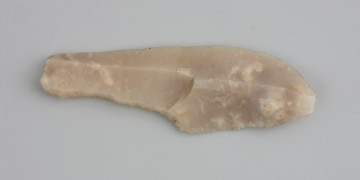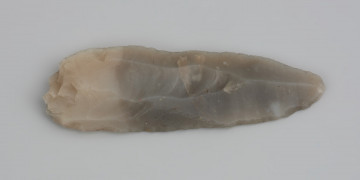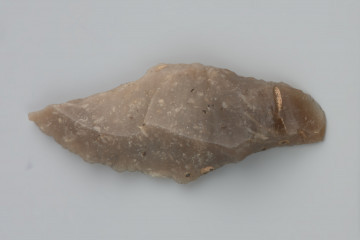
Single-jagged edge
11900 p.n.e. — 11000 p.n.e.
National Museum in Szczecin
Part of the collection: Stone Age
The Fedemesser-type backed blade was found by chance in Łubianka, the Myślibórz district, in 1968 and was donated to the collection of the National Museum (Muzeum Narodowe) in Szczecin. It was made on a simple chip deflected with a soft pestle, e.g., a fragment of antler, from a single-platform core, i.e., with one struck surface to deflect the semi-raw material for producing tools. The backed blade from Łubianka has traces of use in the form of minor chipping on edge and a partial break-off of the top. The damage caused by hitting a hard surface, such as bone or wood, is called impaction. More recent research indicates that the backed blade was made from chalk flint, which is commonly found in Pomerania, and not, as previously thought, from Jurassic flint from the Kraków area. Federmesser backed blades, sometimes referred to as bow thistles, are characteristic elements of the culture of the same name derived from the German word Federmesser - a feather-shaped knife. Depending on their size, backed blades were used as tips and javelins, possibly also arrows. However, traseological studies have revealed that some of them may have been used as knives. The Federmesser culture covered almost the whole North European Lowlands with its range. It is derived from the Upper Palaeolithic Magdalenian culture and its development is linked to the expansion of forest environments in the Allerød at the end of the Pleistocene. The people of this culture occupied diverse ecological niches. It resulted in a somewhat flexible approach to an economy based on diverse resources depending on the season and local environmental conditions.
Michał Adamczyk
Other names
arched backed blade
Author / creator
Dimensions
cały obiekt: height: 4.2 cm, width: 1.3 cm
Object type
backed point
Technique
peeling, carving, soft masher carving
Material
flint, stone
Origin / acquisition method
donation
Creation time / dating
Creation / finding place
Owner
National Museum in Szczecin
Identification number
Location / status

11900 p.n.e. — 11000 p.n.e.
National Museum in Szczecin

11900 p.n.e. — 11000 p.n.e.
National Museum in Szczecin

11500 p.n.e. — 10800 p.n.e.
National Museum in Szczecin
DISCOVER this TOPIC
Museum of King Jan III's Palace at Wilanów
DISCOVER this PATH
Educational path